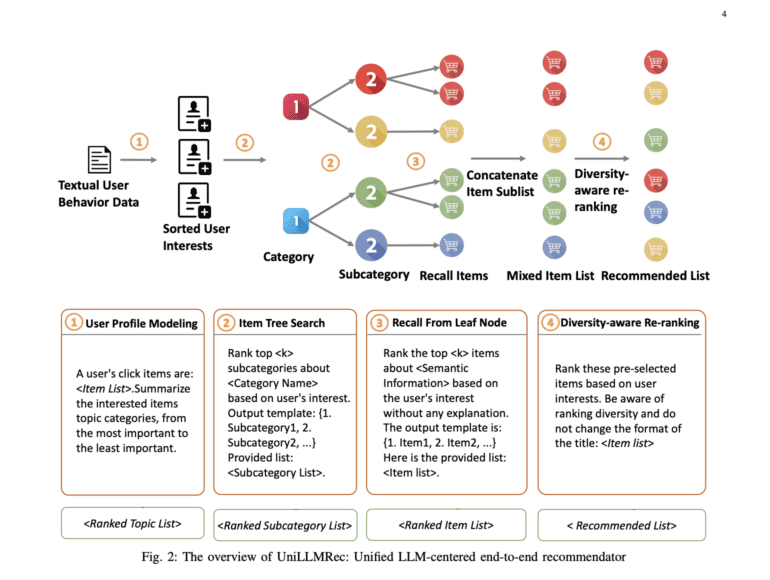- UniLLMRec is a groundbreaking recommendation framework leveraging Large Language Models (LLMs) for seamless execution of item recall, ranking, and re-ranking.
- It addresses the challenges of presenting extensive item sets to LLMs in natural language format, offering a resource-efficient alternative to traditional systems.
- The framework capitalizes on the zero-shot capabilities of LLMs, eliminating the need for training or fine-tuning.
- Researchers have developed a unique tree-based recall strategy to effectively manage large-scale item corpora, optimizing the recall process significantly.
- UniLLMRec integrates multi-stage tasks (e.g., recall, ranking, re-ranking) through a chain of recommendations, contrasting with existing LLM-based systems that primarily focus on ranking candidate items.
Main AI News:
In the realm of recommender systems, the primary aim is to forecast user preferences by leveraging historical data. Typically, these systems operate through sequential pipelines, necessitating copious amounts of data to train disparate sub-systems, which poses challenges for scalability across novel domains. However, recent advancements in Large Language Models (LLMs) like ChatGPT and Claude have showcased exceptional versatility, empowering a single model to address varied recommendation tasks across diverse landscapes. Nonetheless, a significant obstacle remains: presenting extensive item sets to LLMs in natural language form is hindered by input length constraints.
Previous research has predominantly tackled recommendation tasks within the natural language generation framework. These methodologies involve fine-tuning LLMs to cater to various recommendation scenarios via Parameter Efficient Fine Tuning (PEFT), exemplified by techniques such as LoRA and P-tuning. Yet, these approaches encounter three primary challenges: firstly, despite purported efficiency, these fine-tuning methods heavily depend on substantial training data, incurring significant costs and time investments. Secondly, they often fail to fully harness the robust general or multi-task capabilities inherent in LLMs. Thirdly, they lack the ability to effectively articulate large-scale item collections to LLMs in a natural language manner.
In a collaborative effort between the City University of Hong Kong and Huawei Noah’s Ark Lab, UniLLMRec emerges as a pioneering framework that leverages a singular LLM to seamlessly execute item recall, ranking, and re-ranking within an integrated end-to-end recommendation framework. A notable strength of UniLLMRec lies in its exploitation of the intrinsic zero-shot capabilities of LLMs, obviating the need for training or fine-tuning. Consequently, UniLLMRec presents a more streamlined and resource-efficient alternative to conventional systems, thereby facilitating more efficient and scalable implementations across diverse recommendation scenarios.
To ensure the effective management of large-scale item collections, researchers have devised a unique tree-based recall strategy. This strategy entails the construction of a tree that organizes items based on semantic attributes such as categories, subcategories, and keywords, thereby establishing a manageable hierarchy from an extensive item list. Each leaf node in this tree encapsulates a manageable subset of the complete item inventory, facilitating efficient traversal from the root to the relevant leaf nodes. Consequently, item searches are confined to the selected leaf nodes, contrasting starkly with traditional methods that mandate traversing the entire item list, thus optimizing the recall process significantly.
While existing LLM-based systems predominantly concentrate on the ranking stage within recommender systems, typically evaluating only a limited number of candidate items, UniLLMRec stands out as a comprehensive framework that harnesses LLMs to amalgamate multi-stage tasks (e.g., recall, ranking, re-ranking) through a chain of recommendations.
Conclusion:
UniLLMRec’s innovative approach signifies a paradigm shift in recommendation systems, offering enhanced efficiency, scalability, and versatility. Its ability to seamlessly handle multi-stage recommendation tasks and manage large-scale item sets presents significant opportunities for businesses to enhance user experiences and drive revenue growth in diverse recommendation contexts. Businesses adopting UniLLMRec can gain a competitive edge by leveraging its advanced capabilities to deliver tailored recommendations effectively.

